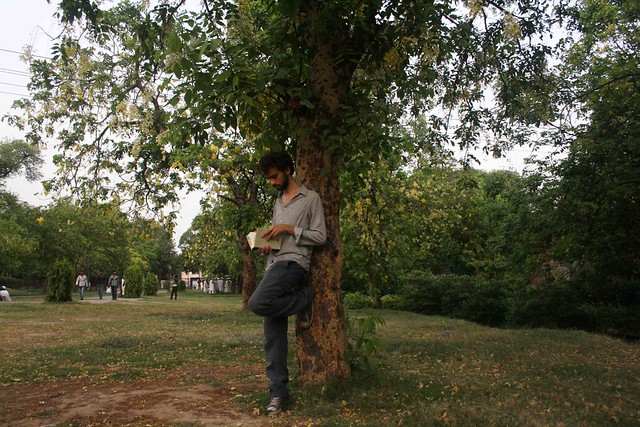
City Reading – The Delhi Proustians XXIII, Outside Humayun’s Tomb

A la recherche du temps perdu.
[Text and photos by Mayank Austen Soofi]
Today is the 23rd meeting of The Delhi Proustians, a club for Delhiwallas that discusses French novelist Marcel Proust. Every Monday evening for an hour we read his masterpiece, In Search of Lost Time.
Each week we meet in a new venue to dive into the atmosphere of Marcel’s novel.
It is 7 pm and The Delhi Walla is with Jonas Moses, a Frenchman. We are in the garden outside Humayun’s Tomb. A month earlier this place was glowing with the bright yellow flowers of the Amaltas. The flowers are still here but the colors have faded. The memory of the absent colours makes the garden more beautiful than it actually is.
The evening is unbearably warm. Mr Moses is standing under an Amaltas.
“Sometimes it is difficult to love Delhi,” I say. “But I must be faithful to my city.”
A few boys are playing cricket nearby. A group of burqa-clad girls is walking on the paved path. One of them is carrying a soccer ball.
“Shall we start?” Mr Moses asks.
“May I request you to read a passage that I had saved for just this kind of evening?” I say.
Mr Moses nods.
I open page 285 and hands over the copy of Swann’s Way, the first of the seven volumes of Lost Time, to Mr Moses. He begins to read.
Physically, she was going through a bad phase; she was putting on weight, and the expressive, sorrowful charm, the surprised, wistful expression of old seemed to have vanished with her first youth.
I’m drenched in sweat. Mr Moses continues.
So that she had become most precious to Swann as it were just at the moment when he found her distinctly less good-looking. He would gaze at her searchingly, trying to recapture the charm which he had once seen in her, and no longer finding it.
This is like my walks in Shahjahanabad where I try to look for its old elegance in its filthy streets, and most of the times I cannot find the beauty that I had read about in books, and then Shahjahanabad seems more precious, more beautiful.
And yet the knowledge that within this new chrysalis it was still Odette who lurked, still the same fleeting, sly, elusive will, was enough to keep Swann seeking as passionately as ever to capture her. Then he would look at photographs of her taken two years before, and would remember how exquisite she had been. And that would console him a little for all the agony he suffered on her account.
The passage ends. I tell Mr Moses about my feelings for Shahjahanabad.
He says, “I think a few themes are in this passage. First, the strange perverse pleasure found in love where you see the flaws, the wrinkles, the fragilities and imperfections as incarnations of a lasting love, as a secret, a mark that only you the lover can see and really appreciate. Only a true lover can love with these imperfections or love what these imperfections suggest. Then I see the eternal Proustian quest for the memory. It is funny to see that the person I loved was a different person, that is he exists in a different way today. Memories are here to reinforce the love. Maybe seeing the wrinkles are like a way to impersonate a lasting love. The gap between memories and time seems to establish a feeling of affectionate nostalgia that inhabits love, or impacts love. This is where the comparison with Shahajanabad is relevant.”
It is 8 pm and still unbearably warm. We must leave now.
Due to the season’s particularly unkind heat and humidity, the next meeting of The Delhi Proustians will take place on July 9. Hopefully, the monsoon will arrive by then. The venue will be announced later this week.
Reading Proust
1.
2.
3.
4.
5.
6.
7.








It really is infernally hot. Merely stepping out of one’s home/office seems an act of defiance and courage. Dainty Proust must wait. Try Crime and Punishment by Fyodor Dostoevsky. Perfect for this time of the year.
Loved the wonderful interpretation by Moses.
A nobel pastime and perfect for Delhi…